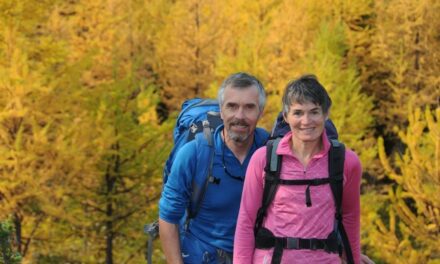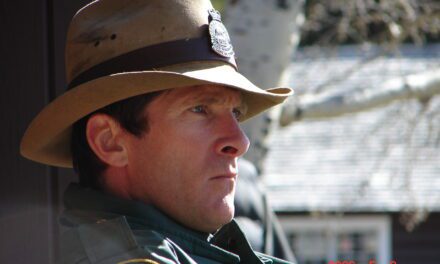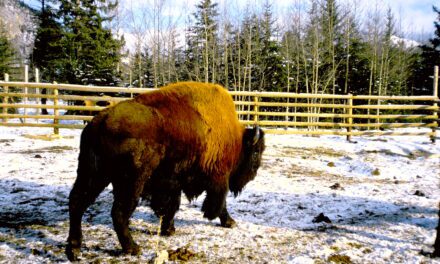I remember Bob Hansen.
Laura: The Fun-Hog. (As Bill would say.)
Kevin: Bob was a seasonal. And for a while the warden managers thought that wardens should come out with us so that there could be that transfer of skills and knowledge. But, very few of the wardens were interested. Bob was an exception, because we were out in the field and he sure liked getting out there. One thing I remember about Bob was going up in the Opal Hills one day…we were out to check small rodent traplines or something like that.
We were walking along (and I didn’t know Bob well) and Bob was saying “Oh man… look at this! This is so beautiful! This is the best day of my life!”
Laura: (laughing)
Kevin: I mentioned this to Adrienne (Bob’s wife) and she said “Bob says that all the time – even in rain storms.”
(Laura and Kevin laughing)
Kevin: He was the most positive guy I ever worked with. Those were the ones I remember interacting with the most.
Laura: Well, I have to say, Bob was the Mayor of Dumpletown.
Kevin: Oh really? (laughing)
Laura: And when Bob moved to the west coast, we moved into he and Adrienne’s little 400 square foot cabin (“Mayor’s Manor”). So then, Bill became the Mayor of Dumpletown. (more laughing).
Laura: So, we’ve touched on these things already, but would you say you’ve had a constructive relationship with the warden service and do you think the warden service had a vital role in the national parks? You’ve kind of touched on this already.
Kevin: I had a constructive relationship with the warden service for most of my life. I think it became more problematic when I became their manager in Jasper. There were always certain wardens that I enjoyed working with less than others. But most of the time I really liked them. I mean we’re kindred spirits. We all tend to have hunting and fishing stories…. You have the same motivations for being out there.
Working in Waterton- embedded in the warden service- it was wonderful. Man, that was a good era. The people down there- it was Derek Tillson, Brent Kozachenko, Edwin Knox, Mary Coleman, Keith Brady, Peter Jowett and of course Bill Dolan. It was a small group, almost like Kootenay – It’s almost like there’s a critical size…middle-sized parks- everyone works together. In bigger parks, they’re all separated out. There were enough of us that we had barely critical mass… so it was really good working with that bunch there. They were good people.
Laura: So, I guess what we’re trying to get to is, what sort of ‘coloured’ things in Banff?
You said the relationship became more difficult.
Kevin: I’ll try to elaborate a little bit. It goes to the evolution of arming park wardens and transition from the old Warden Service to the Resource Conservation function. When I was in Jasper, Brian Wallace was getting ready to retire. I don’t know how enthusiastic he was about retiring; Ron Hooper was superintendent at the time. We were a fairly close group: Me and Ron and Brian and the other managers. I really liked working with Brian. Brian, I think, respected me but there was a tension there. Brian was good at everything I wasn’t good at (all those core competencies that actually make a warden a warden) and I was good at things that Brian had never had a chance to do. I had a university degree and had been a biologist. There was this sense that Parks Canada was beginning to devalue the warden service. It had happened before my time when they had pulled the wardens out of districts and created a function-based organization as a result of an earlier management review. Some of the old guard felt that there was an erosion of what made a warden a warden, when you stop being a generalist and stop being based on one piece of land and become more attached to a specialty. So that was already in play. So, through those big reorganizations that Parks Canada did in the mid ‘80’s and then again in the early ‘90’s… there was always this sense that the warden service was somehow on the defensive. That people were trying to get them out of things, like get them out of the backcountry; get them off horses…So… this was bubbling up. Meantime, in the 1990s organizational reviews, I helped convince management that we really didn’t need Ecosystem Secretariat Managers, and that most of what was assigned to that role belonged in Resource Conservation. In the process of winning that debate, I did myself out of my job.
Given Brian’s imminent retirement, it seemed obvious that the easiest thing to do was to put me in Brian’s job when he left. I was already classified at the same level and I had worked in the warden service, although mostly as a biologist. I’d had operational duties but never got enough experience at them in Waterton to get good at them. And of course, the other thing was that I had experience in Jasper. I had worked with half these people. I had worked with them during my time on the wildlife inventory.
Laura: So, you took over Brian Wallace’s job when he retired?
Kevin: Ya. But it wasn’t good because he didn’t go out happy; I think he went out a bit unhappy. And I came in as this arming issue had blown up. So, it was bubbling there. So, although I was their manager, and I knew many of them personally and was friends with them, there was this BIG Magnifying glass sitting over me. “We don’t think he belongs in that position. There are other people who have earned that position through working in res con (resource conservation) for much longer than him (me) who’ve actually done stuff.” Like, I’d never climbed in my life, right? I had only very limited horse experience, and had never worked in fire except in a communications capacity. So, putting me in charge felt to some wardens like just another example of what Parks Canada was doing to the warden service, do you know what I mean? So it was actually really challenging. I will say, it was a problem for me because I’ve always been one that believes that if you are given a job to do, you do the job.
So, if I’m working for Parks Canada, and Parks Canada is changing things, then it’s my job to manage that change. So, if we’re supposed to start calling ourselves “Resource Conservation”, well then dammit, we’re going to call ourselves ‘Resource Conservation’. But, in taking that position, that’s more loaded than you think. Because, (it appears like) you are actually saying ‘I’m taking a side, but taking a side against us’.
Laura: Ah, okay.
Kevin: So, there was that whole question about “Is he really one of the organisations enough to be leading it?” “Where are his loyalties?” If you’re not going to be loyal to the guardian culture that you’ve taken over, then you’re with those other guys. That means that now we are going to organize against you, in a way. There were some really unpleasant, aggressive messages sent to me in my first two weeks on the job.
Laura: Well, how hard that must have been for you and your young family there. That must have been very challenging. It’s not just you, it’s your family.
Kevin: It was challenging but bear in mind it was just a piece of what everyone else was going through too. Morale was not good. “People who thought they knew what they had signed up for and what this organization was, keep getting these messages that seem to make it sound like they’re not being valued. So, they’re thinking: “How much longer is this going to last for me?” I was in there as an acting appointment. Ron wanted to appoint me permanently. Gabby Fortin wouldn’t let him. (Gabby was having these one-on-one conversations with wardens and I guess, getting the message that this ‘ain’t gonna work’.)
Then I went to Prince Albert National Park. There was a backstory there too. There was a lot of trauma in Parks Canada through the late ‘80’s-early 90’s.
Laura: Hmm. So, I didn’t know you were at PA.
Kevin: I was in the Northern Prairies Field Unit and I was based in PA. I had that for two years. I had PA, Elk Island, and the Historic Sites in central Saskatchewan.
Laura: So, what years did you go to Prince Albert?
Kevin: I was superintendent of the Northern Prairies Field Unit from October 2005 to January 2008.
Laura: So, what were you doing in Prince Albert?
Kevin: Canada had revised the National Parks Act and put in the ‘Ecological Integrity clause’ which makes it the single highest priority for anything involved in the national parks, right? So that was what actually triggered the hiring of biologists. If you’re going to have ecological integrity responsibilities, we better know what the heck we’re talking about. So, in many ways, this sort of framed a lot of my career development. This ‘ecological integrity’ brought me back into biology. It’s what brought me into the warden service- or res con (resource conservation).
And, what had happened was, we developed an ecological integrity training program for the entire organization. I was involved in the development of it. We had a team pulled from across the country. And we delivered it. We basically re-educated our organization around ecological integrity and around the integrated mandate (versus the old dual-mandate myth).
The training was to help everyone understand what it meant to our jobs now that we had this ecological integrity statement in our National Parks Act. It was mostly resource conservation and interpretation who were most of the participants, but there were a lot of people there. Their whole idea was that the whole organization was going to have this training. It was rolled out for a year or two. I remember teaching it as well as helping to develop it. A lot of staff took it seriously because really, it is where most of our values are based. They took it to heart. And so, what happened in Prince Albert National Park before I got there, was that they had a big Spruce Budworm outbreak. Parks Canada came under an awful lot of pressure from the rich cottagers who live at Waskesiu saying “We’re going to lose all these beautiful spruce trees that make our holiday homes so beautiful. So, you’ve got to spray.”




A really good interview. Kevin had challenging management decisions for a challenging time in Parks Canada!
Good job Laura!